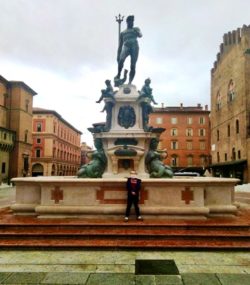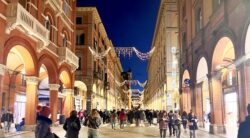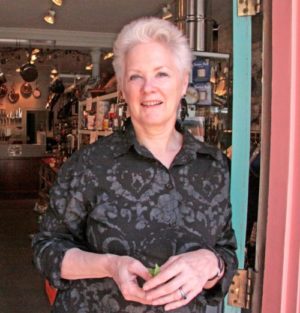Read Time: 8 Minutes Subscribe & Share
Bologna Brouhaha
 Several KD readers sent me the link to this opinion piece about the desecration of her hometown, Bologna, by an Italian journalist as a guest essay in the New York Times. As a retired American currently living in the Centro Storico, which Ms. Sala describes as frenzied and over-saturated by insensate tourists, perhaps I should weigh in. To bring you up to speed, here’s the link to her Guest Essay in this venerable newspaper:
Several KD readers sent me the link to this opinion piece about the desecration of her hometown, Bologna, by an Italian journalist as a guest essay in the New York Times. As a retired American currently living in the Centro Storico, which Ms. Sala describes as frenzied and over-saturated by insensate tourists, perhaps I should weigh in. To bring you up to speed, here’s the link to her Guest Essay in this venerable newspaper:
Ilaria Maria Sala, the freelance journalist, currently lives in Hong Kong after spending unspecified times in Beijing, Tokyo, London, Kathmandu, New York, Shanghai and Dakar, according to her profile in The HongKonger. You are informed from her Instagram account that she is also a ceramicist with a strong interest in veganism, tea and poetry. She has won some journalism awards and written for a moderately wide range of publications. So, I assume she is no stranger to globalization.
The main points of her essay are:
On a visit to her hometown, some of the businesses that she may have frequented had closed and were replaced by a chain of delicatessens in the Quadrilatero -a much visited old market area adjacent to Piazza Maggiore.
Bologna is littered with pig symbols, which are subliminal reminders of the industrial slaughter of pigs for mountains of mortadella.
It appears that the main focus of the Bologna hospitality industry is to force-feed tourists with mind-numbing amounts of mortadella.
Fried tortellini is a current trend sold to tourists and is an inauthentic street food – while delicious because they are fried – so tourists are not getting a real local experience.
The cordoned-off leaning tower Garisenda is no longer available for sightseeing – the inference is that this is due to over-tourism rather than the natural degradation of structures over centuries ( there were almost 200 of these towers in Bologna; most of them have fallen down in previous centuries).
Low-cost airlines and short-term rentals of apartments and rooms have increased the number of visitors, which has robbed students of affordable housing.
She misses the Bologna of her youth, which had a more subdued and acceptable form of tourism.
We Are All Tourists Sometimes
We had been visiting Bologna for almost 20 years before moving here to be near our daughters and grandchildren. And certainly, with the increase in low-cost airfares (Let him cast the first stone who has not used Ryanair or EasyJet) to cities outside of the eternal tourist triangle of Rome-Florence-Venice, visitor traffic has increased mightily. These low-cost airlines actually get subsidies from the local governments and in turn provide a significant percentage of jobs.
The birth of the Airbnb craze, once seen as a good way for people of lesser incomes to make some money from a spare room in their apartment or house, has exploded not only from an increase in tourism but also from corporate creep. And as this has become a serious housing issue, local governments need the power to regulate these short-term rentals according to the community’s needs. Actually, New York City has recently altered its short-term rental regulations successfully (there are considerably fewer Airbnb offerings) pushing a percentage of tourists back into hotels.
Bologna has always been a city filled with transients, both students and teachers, from the inception of its revered university in the 11th century. Currently five American universities partner with it along with a host of other foreign universities – Canada, Mexico, Japan, for example. Its very fluid international student population makes up under 12% of the student body. Bologna has been a city of commercial fairs since the 19th century, and it justifiably has tried to expand this sector. Although short-term rentals have certainly exacerbated the issue of affordable housing, this has long been a serious conundrum here.
This latest explosion of tourism hastened by post-Covid pandemic travel also intersected with businesses that could not survive closures caused by the quarantines. Unrelated, but it needs to be noted, long standing business also close due to retirement or because the market for what they sell has changed.
 I currently live on one of the most chain store “infested” streets, and part of it is made into pedestrian-only traffic on the weekends, which creates its own crowd scene. But some of the chains are quite nice to shop in, and boast excellent customer service. But really, a block off from Via dell’ Indipendenza in either direction are two streets, all with even smaller side streets with independent stores, galleries and restaurants. One is quite busy, the other more residential and restrained. Nary a piggy keychain in sight nor windows filled with bulbous rounds of mortadella.
I currently live on one of the most chain store “infested” streets, and part of it is made into pedestrian-only traffic on the weekends, which creates its own crowd scene. But some of the chains are quite nice to shop in, and boast excellent customer service. But really, a block off from Via dell’ Indipendenza in either direction are two streets, all with even smaller side streets with independent stores, galleries and restaurants. One is quite busy, the other more residential and restrained. Nary a piggy keychain in sight nor windows filled with bulbous rounds of mortadella.
Speaking Of Mortadella
 I happily eat, several times a year, a sandwich made at Mo Mortadella Lab on Via dei Monari. It is really popular year round, not simply when the mortadella-force-fed tourists are in full strength. They just opened another venue – it is the brainstorm of three young entrepreneurs, and I think it is great. After living in the US where chicken Mcnuggets and Big Macs seem to reign supreme, I think Mo’s version of Bologna’s signature cold cut since 1661 is terrific, and unlike the hideous ingredients of McNuggets, about which I unfortunately know too much, the mortadella is top quality as are the other ingredients, and they source a good roll. Of course, they have competition in the mortadella theater, and how neat that they do.
I happily eat, several times a year, a sandwich made at Mo Mortadella Lab on Via dei Monari. It is really popular year round, not simply when the mortadella-force-fed tourists are in full strength. They just opened another venue – it is the brainstorm of three young entrepreneurs, and I think it is great. After living in the US where chicken Mcnuggets and Big Macs seem to reign supreme, I think Mo’s version of Bologna’s signature cold cut since 1661 is terrific, and unlike the hideous ingredients of McNuggets, about which I unfortunately know too much, the mortadella is top quality as are the other ingredients, and they source a good roll. Of course, they have competition in the mortadella theater, and how neat that they do.
Outsider Thoughts
Contrary to the belief that history is some sort of static slide-show of quaintness for just a few select visitors, cities and towns evolve or their inhabitants leave or die. Historical events, economic changes, political interventions all play a part in how a community survives. Some of it is not pretty, and as the problems arise, solutions are tried – sometimes with success, sometimes not.
What a shame it would be if your only time as a tourist in New York City was spent in the environs of Times Square, or in the cross hairs of Wisconsin Avenue and M Street in Washington DC. Even in my former city (which is very proud of its Old Town tourist attractions) should you never stray from lower King Street, you would have similar complaints as Ms. Sala. The food is gross, the kitsch purveyors overwhelming and the crowds daunting.
The Mayor Responds
The Mayor of Bologna, who seems to me to be a young and forward-thinking politician, has a degree in political science at the University of Bologna and three Masters degrees, one in urban planning and building, another in cooperative economics, and a third in international relations. His dietary preference is not included in his Instagram account, but rather that he is a basketball fan. Matteo Lepore wrote a letter to the New York Times, which I don’t think was published by the paper although it purports to give its readers “All The News That’s Fit To Print”. He did, however, post it on his Facebook page. I have quoted parts of it below.
in political science at the University of Bologna and three Masters degrees, one in urban planning and building, another in cooperative economics, and a third in international relations. His dietary preference is not included in his Instagram account, but rather that he is a basketball fan. Matteo Lepore wrote a letter to the New York Times, which I don’t think was published by the paper although it purports to give its readers “All The News That’s Fit To Print”. He did, however, post it on his Facebook page. I have quoted parts of it below.
I usually avoid replying to clichés about Bologna, but this time I can’t help myself since the most read newspaper in the world, the New York Times, is talking about it.
The article is written by a certain Maria Sala, a journalist who claims to be born under the two towers, but lives abroad and writes from Hong Kong.
As Mayor I want to express my strongest indignation towards those who insult our city by portraying it as a mortadella factory and also for this reason I have decided to write directly to the prestigious American newspaper highlighting the damage to our image caused to us.
He goes on to say that yes, Bologna is becoming a “new city” that Americans do love to visit, and some come here to work. Further, he writes:
As a progressive mayor I have always stated that I would never rest on wealth, to instead try to reduce the inequalities and wounds of evident growth.
We have activated a unique Living Plan in Italy, in the absence of national housing funds the right to study (220 million euros). We have been fighting for years for a law aimed at regulating short-term rentals that gives powers to Mayors (today we have none on the matter) against lobbies and distracted national politics.
Bologna is affected by phenomena that affect all advanced Western cities, such as the arrival of platforms for short-term rentals and global warming, but it remains a city with solid welfare and capable of expanding from year to year.
Cities are the frontier and the place of conflict between old and new interests. I often talk about this with my European and American colleagues. We all experience the same contradictions but, I assure you, no one would ever think of defining Bologna as a city with a brain, heart and eyes clogged with mortadella.
Given that the shops that the journalist says have disappeared have been missing for over twenty years now, tourism has arrived in Italy and before that the liberalization of trade licenses.
Many talk about overtourism, we have been dealing with it for years by promoting the metropolitan destination to help the Apennine territory grow, for example, not just our Quadrilatero. We united Modena and Bologna for this very reason in tourism.
For some time now, we have no longer spent a single euro promoting the destination, but everything in taking care of the quality of hospitality and support for businesses in the sector…
Food has always been an element of Bologna’s identity, but culture and landscape are the reasons why people come to visit us from outside.
Well said, in my opinion, and it’s a shame that NY Times readers were denied a chance to learn this other side of the story.

Kitchen Detail shares under the radar recipes, explores the art of cooking, the stories behind food, and the tools that bring it all together, while uncovering the social, political, and environmental truths that shape our culinary world.




Great article. Thanks for taking time to provide us with much-needed perspective.
Hi Susan,
Good to hear from you on the KD page! I have loved your comments about US politics on Facebook!
Thank you Nancy! Unfortunately, even newspapers of record use startling opinion pieces to pull readers in. They can distance themselves from the substance simply because it’s an “opinion” piece. It was great to hear from you Mayor Lepore’s well-framed defense of his beloved Bologna. Well done!
Hi Robin,
Yes, even the NY Times is becoming kind of shill for TV type broadcast news. His letter should have been included.
Nancy
THANK YOU for running the mayor’s letter! I read the NYT article when it came out and the first thing I thought of was you! Oh, no, poor Nancy! Appreciate the wider context and points of view (and wish we had more politicians of Signor Lepore’s ilk).
Hi Cindy,
Yes, he seems to be a very active mayor. And his comments should have been included in the New York Times Opinion Section!
Nancy
Thank you for publishing the “other side of the story”. Many cities in America, including the one I live in, need to do a better job of dealing with the issues of global warning and short term rentals. The biggest problem we see with short term rentals, besides contributing to a housing shortage, is how the phenomenon contributes to isolation and lonliness. Our neighborhoods used to be places for people to socialize and get to know one another. Now, many of the homes are essentially empty except for the short term renters. Some cities are figuring out how to balance… Read more »
Hi Susan,
The ghosting of neighborhoods is a very good point. I had not thought of that but my daughter here says you can see it in Bologna. And yes, weather is clearly more extreme, but I am hopeful that the EU is addressing the issue of climate change.
Nancy
I found the mayor’s reply to be the exact letter to the editor that was, and sadly is no more, expected to be promptly published in a major paper. Frankly, I now only subscribe to the on line NYT food sections. So far that area seems to be interested in enlightening not disparaging cuisine and localities. Having grown up in Healdsburg, CA and left for Santa Barbara in 1975 I am proud of my hometown but have no expectations that it could have thrived and not changed in ways I like and ways I wish it hadn’t. But I will… Read more »
Hi Kathleen,
Wise advice from your mother. I am tempted to do likewise about the NY Times. Their management seems to be caught up in the same cycle of headlining what should be trivial instead of that is really important for us all.
Nancy